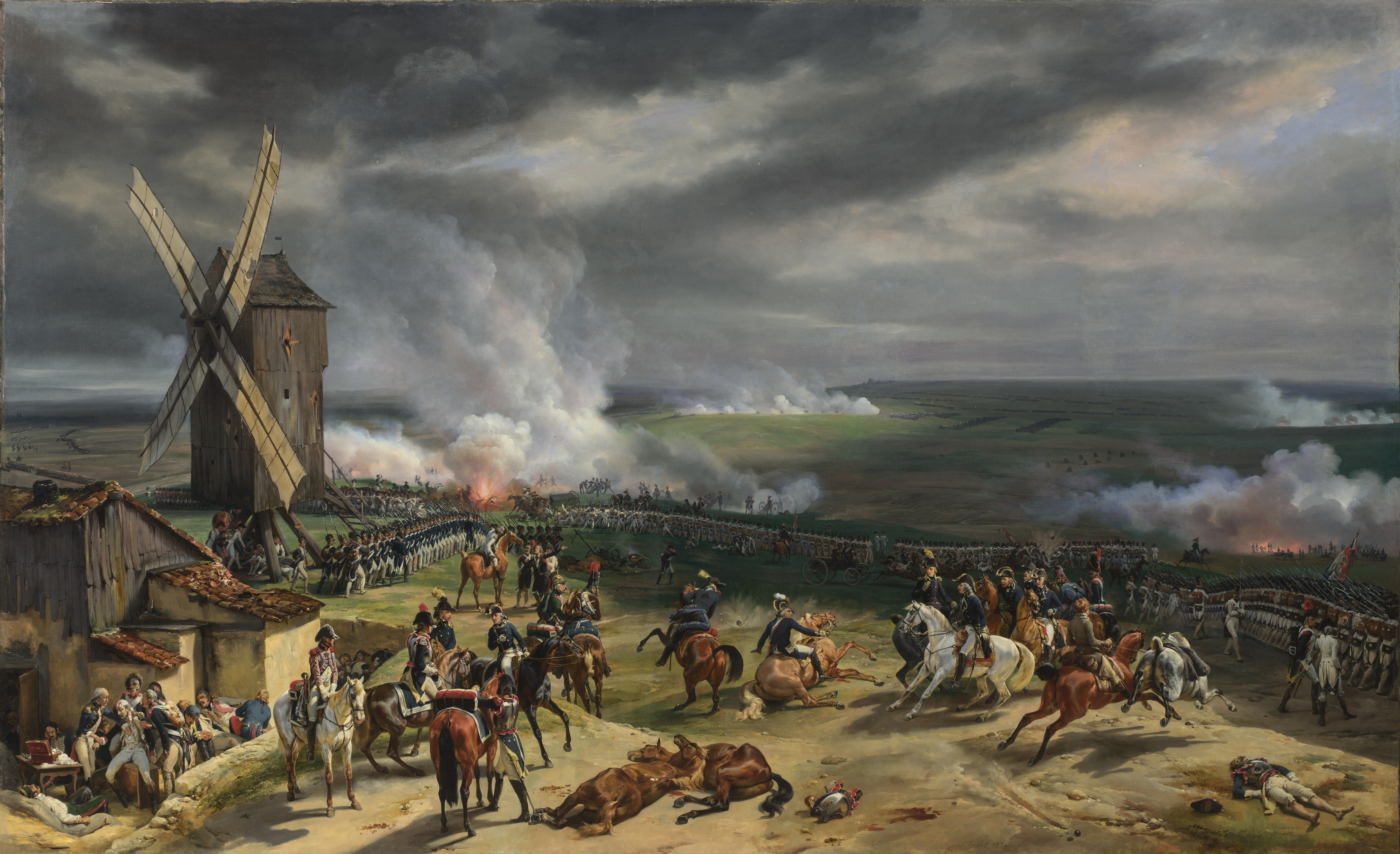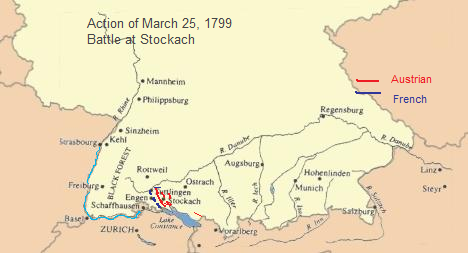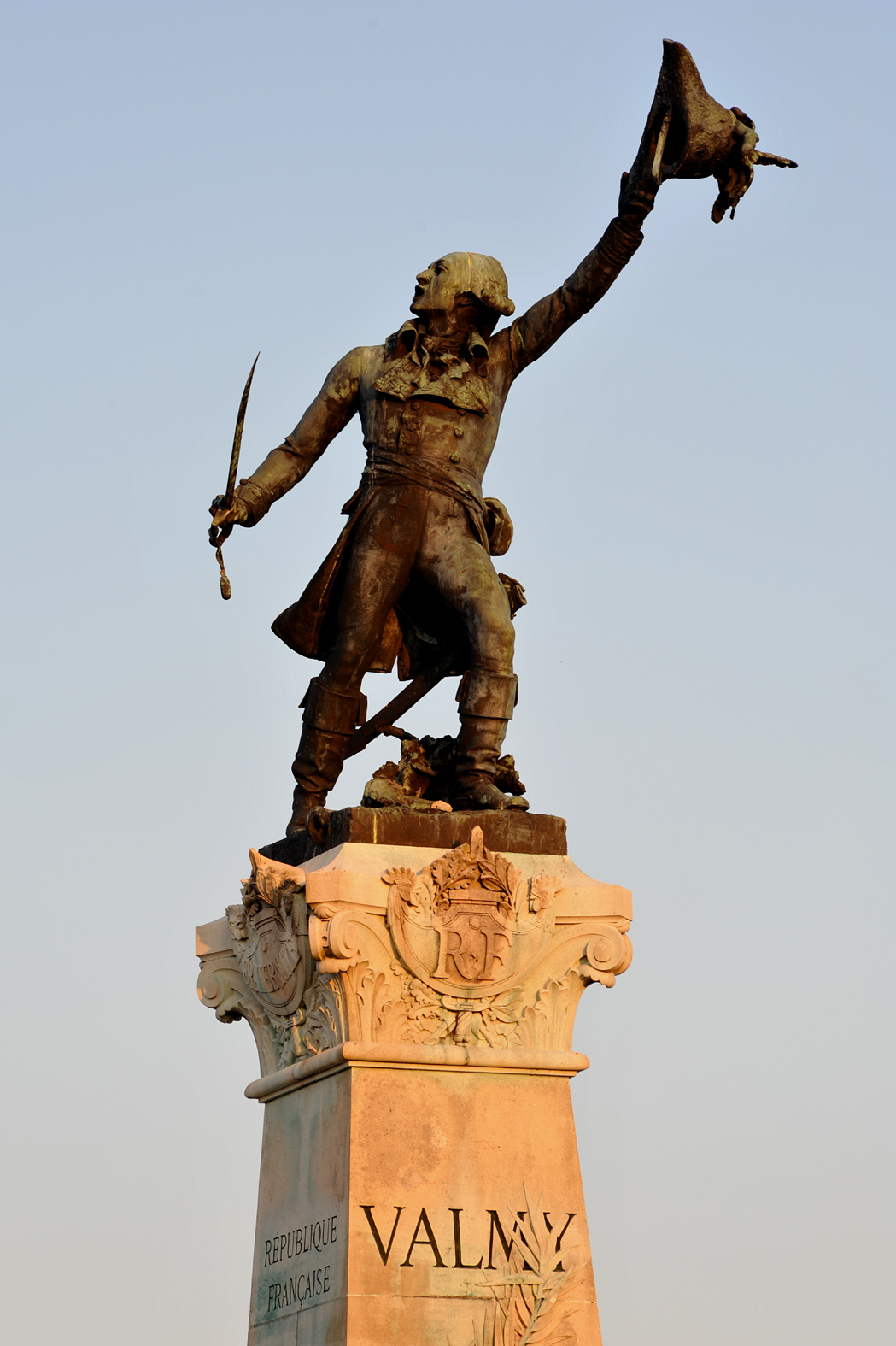|
Armand Von Nordmann
Joseph-Armand Ritter von Nordmann (31 August 1759 – 6 July 1809), was a French officer in the French Royal Army. He transferred his allegiance to Habsburg Austria during the French Revolution, like other French émigrés. In Austrian service he fought capably against his former country during the French Revolutionary Wars and the Napoleonic Wars. A colonel in the French army, he defected to the Coalition forces in 1793. After fighting in one of the émigré armies, he became an Austrian officer in 1798. After commanding a cavalry regiment for several years, he was elevated in rank to general officer. He led a division in 1805, even though by rank he was a brigadier. From the start of the 1809 war, he was entrusted with small independent scouting forces and rear guards. He was promoted again to lead a corps-sized force shortly before he was killed at the Battle of Wagram. French Revolutionary Wars Born at Molsheim in Alsace on 31 August 1759, Nordmann joined the French Arm ... [...More Info...] [...Related Items...] OR: [Wikipedia] [Google] [Baidu] |
Molsheim
Molsheim () is a commune and a subprefecture in the Bas-Rhin department in Grand Est in north-eastern France.Commune de Molsheim (67300) INSEE The total population in 2017 was 9,312. Molsheim had been a very fast-growing city between the French censuses of 1968 and 1999, passing from 5,739 to 9,335 inhabitants, but this increase came to a noticeable halt since. The of Molsheim had 26,925 inhabitants in 2017, from 16,888 in 1968. Molsheim is part of the of |
Alsace
Alsace (, ; ; Low Alemannic German/ gsw-FR, Elsàss ; german: Elsass ; la, Alsatia) is a cultural region and a territorial collectivity in eastern France, on the west bank of the upper Rhine next to Germany and Switzerland. In 2020, it had a population of 1,898,533. Alsatian culture is characterized by a blend of Germanic and French influences. Until 1871, Alsace included the area now known as the Territoire de Belfort, which formed its southernmost part. From 1982 to 2016, Alsace was the smallest administrative ''région'' in metropolitan France, consisting of the Bas-Rhin and Haut-Rhin departments. Territorial reform passed by the French Parliament in 2014 resulted in the merger of the Alsace administrative region with Champagne-Ardenne and Lorraine to form Grand Est. On 1 January 2021, the departments of Bas-Rhin and Haut-Rhin merged into the new European Collectivity of Alsace but remained part of the region Grand Est. Alsatian is an Alemannic dialect closely related ... [...More Info...] [...Related Items...] OR: [Wikipedia] [Google] [Baidu] |
Dragoon
Dragoons were originally a class of mounted infantry, who used horses for mobility, but dismounted to fight on foot. From the early 17th century onward, dragoons were increasingly also employed as conventional cavalry and trained for combat with swords and firearms from horseback. While their use goes back to the late 16th century, dragoon regiments were established in most European armies during the 17th and early 18th centuries; they provided greater mobility than regular infantry but were far less expensive than cavalry. The name reputedly derives from a type of firearm, called a ''dragon'', which was a handgun version of a blunderbuss, carried by dragoons of the French Army. The title has been retained in modern times by a number of armoured or ceremonial mounted regiments. Origins and name The establishment of dragoons evolved from the practice of sometimes transporting infantry by horse when speed of movement was needed. In 1552, Alexander Farnese, Duke of Parma ... [...More Info...] [...Related Items...] OR: [Wikipedia] [Google] [Baidu] |
Oberst
''Oberst'' () is a senior field officer rank in several German-speaking and Scandinavian countries, equivalent to colonel. It is currently used by both the ground and air forces of Austria, Germany, Switzerland, Denmark, and Norway. The Swedish rank '' överste'' is a direct translation, as are the Finnish rank ''eversti'' and the Icelandic rank ''ofursti''. History and origins is a German word. Spelled with a capital O, "" is a noun and defines the military rank of colonel or group captain. Spelled with a lower case o, or "", it is an adjective, meaning "top, topmost, uppermost, highest, chief, head, first, principal, or supreme". Both usages derive from the superlative of , "the upper" or "the uppermost". As a family name, ''Oberst'' is common in the southwest of Germany, in the area known as the Black Forest (''Schwarzwald''). The name is also concentrated in the north-central cantons of Switzerland ( Aargau & Zürich). Here the Swiss version of ''Oberst'' is spelled ''Ob ... [...More Info...] [...Related Items...] OR: [Wikipedia] [Google] [Baidu] |
Andelfingen, Switzerland
Andelfingen is a village and a municipality in the district of Andelfingen in the canton of Zürich in Switzerland. On 1 January 2023 the former municipalities of Adlikon and Humlikon merged to form the municipality of Andelfingen. History Andelfingen is first mentioned in 1248 as ''Andelfingon''. Until 1970, it was known as ''Grossandelfingen''. Geography Andelfingen has an area of . Of this area, 47.4% is used for agricultural purposes, while 34.1% is forested. Of the rest of the land, 14.2% is settled (buildings or roads) and the remainder (4.3%) is non-productive (rivers, glaciers or mountains). The municipality is the capital of the district of Andelfingen. It is located on the southern banks of the river Thur. Demographics Andelfingen has a population (as of ) of . , 11.6% of the population was made up of foreign nationals. Over the last 10 years the population has grown at a rate of 10.1%. Most of the population () speaks German (89.5%), with Italian being second most ... [...More Info...] [...Related Items...] OR: [Wikipedia] [Google] [Baidu] |
First Battle Of Stockach
The Battle of Stockach occurred on 25 March 1799, when French and Austrian armies fought for control of the geographically strategic Hegau region in present-day Baden-Württemberg.There was a second battle the following year—see Second Battle of Stockach. Some older English sources refer to this as the Battle of Stochach and some French chronicles as Battle of Liptingen (or Leibtengen). In the broader military context, this battle constitutes a keystone in the first campaign in southwestern Germany during the Wars of the Second Coalition, part of the French Revolutionary Wars. It was the second battle between the French Army of the Danube, commanded by Jean-Baptiste Jourdan, and the Habsburg Army under Archduke Charles; the armies had met a few days earlier, 20–22 March, on the marshy fields southeast of Ostrach and the Pfullendorf heights. The Austrian Army's superior strength, almost three-to-one, forced the French to withdraw. At Stockach, the French concentrated ... [...More Info...] [...Related Items...] OR: [Wikipedia] [Google] [Baidu] |
War Of The Second Coalition
The War of the Second Coalition (1798/9 – 1801/2, depending on periodisation) was the second war on revolutionary France by most of the European monarchies, led by Britain, Austria and Russia, and including the Ottoman Empire, Portugal, Naples and various German monarchies. Prussia did not join this coalition, and Spain supported France. The overall goal of Britain and Russia was to contain the expansion of the French Republic and restore the monarchy in France, whereas Austria, still weakened and in deep financial debt from the War of the First Coalition, primarily sought to recover its position and come out of the war stronger than it entered. Due in important part to this difference in strategy among the three major allied powers, the Second Coalition failed to overthrow the revolutionary regime, and French territorial gains since 1793 were confirmed. In the Franco–Austrian Treaty of Lunéville in February 1801, France held all its previous gains and obtained new land ... [...More Info...] [...Related Items...] OR: [Wikipedia] [Google] [Baidu] |
Oberstleutnant
() is a senior field officer rank in several German-speaking and Scandinavian countries, equivalent to Lieutenant colonel. It is currently used by both the ground and air forces of Austria, Germany, Switzerland, Denmark, and Norway. The Swedish rank is a direct translation, as is the Finnish rank . Austria Austria's armed forces, the ''Bundesheer'', uses the rank Oberstleutnant as its sixth-highest officer rank. Like in Germany and Switzerland, Oberstleutnants are above Majors and below Obersts. The term also finds usage with the Austrian Bundespolizei (federal police force) and Justizwache (prison guards corps). These two organizations are civilian in nature, but their ranks are nonetheless structured in a military fashion. Belgium File:Army-BEL-OF-04.svg, nl-BE, Luitenant-kolonelgerman: Oberstleutnant Denmark The Danish rank of is based around the German term. Ranked OF-4 within NATO and having the paygrade of M401, it is used in the Royal Danish Army and the ... [...More Info...] [...Related Items...] OR: [Wikipedia] [Google] [Baidu] |
Napoleon Bonaparte
Napoleon Bonaparte ; it, Napoleone Bonaparte, ; co, Napulione Buonaparte. (born Napoleone Buonaparte; 15 August 1769 – 5 May 1821), later known by his regnal name Napoleon I, was a French military commander and political leader who rose to prominence during the French Revolution and led Military career of Napoleon Bonaparte, successful campaigns during the French Revolutionary Wars, Revolutionary Wars. He was the ''de facto'' leader of the First French Republic, French Republic as First Consul from 1799 to 1804, then Emperor of the French from 1804 until 1814 and again in Hundred Days, 1815. Napoleon's political and cultural legacy endures to this day, as a highly celebrated and controversial leader. He initiated many liberal reforms that have persisted in society, and is considered one of the greatest military commanders in history. His wars and campaigns are studied by militaries all over the world. Between three and six million civilians and soldiers Napoleonic Wa ... [...More Info...] [...Related Items...] OR: [Wikipedia] [Google] [Baidu] |
War Of The First Coalition
The War of the First Coalition (french: Guerre de la Première Coalition) was a set of wars that several European powers fought between 1792 and 1797 initially against the Kingdom of France (1791-92), constitutional Kingdom of France and then the French First Republic, French Republic that succeeded it. They were only loosely allied and fought without much apparent coordination or agreement; each power had its eye on a different part of France it wanted to appropriate after a French defeat, which never occurred. Noah Shusterman – ''De Franse Revolutie (The French Revolution).'' Veen Media, Amsterdam, 2015. (Translation of: ''The French Revolution. Faith, Desire, and Politics.'' Routledge, London/New York, 2014.) Chapter 7 (p. 271–312) : The federalist revolts, the Vendée and the beginning of the Terror (summer–fall 1793). Relations between the French revolutionaries and neighbouring monarchies had deteriorated following the Declaration of Pillnitz in August 1791. Eight mo ... [...More Info...] [...Related Items...] OR: [Wikipedia] [Google] [Baidu] |
Battle Of Valmy
The Battle of Valmy, also known as the Cannonade of Valmy, was the first major victory by the army of France during the Revolutionary Wars that followed the French Revolution. The battle took place on 20 September 1792 as Prussian troops commanded by the Duke of Brunswick attempted to march on Paris. Generals François Kellermann and Charles Dumouriez stopped the advance near the northern village of Valmy in Champagne-Ardenne. In this early part of the Revolutionary Wars—known as the War of the First Coalition—the new French government was in almost every way unproven, and thus the small, localized victory at Valmy became a huge psychological victory for the Revolution at large. The outcome was thoroughly unexpected by contemporary observers—a vindication for the French revolutionaries and a stunning defeat for the vaunted Prussian army. The victory emboldened the newly assembled National Convention to formally declare the end of monarchy in France and to establish th ... [...More Info...] [...Related Items...] OR: [Wikipedia] [Google] [Baidu] |
François Christophe Kellermann
François () is a French masculine given name and surname, equivalent to the English name Francis. People with the given name * Francis I of France, King of France (), known as "the Father and Restorer of Letters" * Francis II of France, King of France and King consort of Scots (), known as the husband of Mary Stuart, Queen of Scots * François Amoudruz (1926–2020), French resistance fighter * François-Marie Arouet (better known as Voltaire; 1694–1778), French Enlightenment writer, historian, and philosopher *François Aubry (other), several people *François Baby (other), several people * François Beauchemin (born 1980), Canadian ice hockey player for the Anaheim Duck *François Blanc (1806–1877), French entrepreneur and operator of casinos *François Boucher (other), several people *François Caron (other), several people * François Cevert (1944–1973), French racing driver * François Chau (born 1959), Cambodian American actor * F ... [...More Info...] [...Related Items...] OR: [Wikipedia] [Google] [Baidu] |








